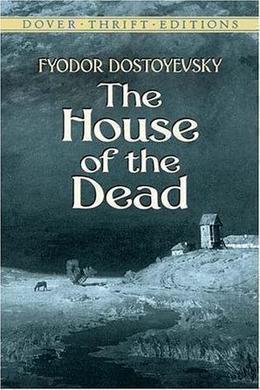
-
EPUB 384 KB
-
Kindle 509 KB
-
Support epubBooks by making a small $2.99 PayPal donation purchase.
Description
The House of the Dead is a fictionalized memoir of a man serving a ten-year prison sentence for murdering his wife. Dostoyevsky drew heavily from his own four-year prison internment in a Siberian prison to draw attention to the dehumanizing, deadening effects of the modern prison system and invoke his philosophies of better ways of treating and rehabilitating prisoners.
490 pages with a reading time of ~7.50 hours (122593 words), and first published in 1861. This DRM-Free edition published by epubBooks, 2014.
Community Reviews
There are currently no other reviews for this book.
Excerpt
In the midst of the steppes, of the mountains, of the impenetrable forests of the desert regions of Siberia, one meets from time to time with little towns of a thousand or two inhabitants, built entirely of wood, very ugly, with two churches—one in the centre of the town, the other in the cemetery—in a word, towns which bear much more resemblance to a good–sized village in the suburbs of Moscow than to a town properly so called. In most cases they are abundantly provided with police–master, assessors, and other inferior officials. If it is cold in Siberia, the great advantages of the Government service compensate for it. The inhabitants are simple people, without liberal ideas. Their manners are antique, solid, and unchanged by time. The officials who form, and with reason, the nobility in Siberia, either belong to the country, deeply–rooted Siberians, or they have arrived there from Russia. The latter come straight from the capitals, tempted by the high pay, the extra allowance for travelling expenses, and by hopes not less seductive for the future. Those who know how to resolve the problem of life remain almost always in Siberia; the abundant and richly–flavoured fruit which they gather there recompenses them amply for what they lose.
As for the others, light–minded persons who are unable to deal with the problem, they are soon bored in Siberia, and ask themselves with regret why they committed the folly of coming. They impatiently kill the three years which they are obliged by rule to remain, and as soon as their time is up, they beg to be sent back, and return to their original quarters, running down Siberia, and ridiculing it. They are wrong, for it is a happy country, not only as regards the Government service, but also from many other points of view.
The climate is excellent, the merchants are rich and hospitable, the Europeans in easy circumstances are numerous; as for the young girls, they are like roses and their morality is irreproachable. Game is to be found in the streets, and throws itself upon the sportsman’s gun. People drink champagne in prodigious quantities. The caviare is astonishingly good and most abundant. In a word, it is a blessed land, out of which it is only necessary to be able to make profit; and much profit is really made.
It is in one of these little towns—gay and perfectly satisfied with themselves, the population of which has left upon me the most agreeable impression—that I met an exile, Alexander Petrovitch Goriantchikoff, formerly a landed proprietor in Russia. He had been condemned to hard labour of the second class for assassinating his wife. After undergoing his punishment—ten years of hard labour—he lived quietly and unnoticed as a colonist in the little town of K―. To tell the truth, he was inscribed in one of the surrounding districts; but he resided at K―, where he managed to get a living by giving lessons to children. In the towns of Siberia one often meets with exiles who are occupied with instruction. They are not looked down upon, for they teach the French language, so necessary in life, and of which without them one would not, in the distant parts of Siberia, have the least idea.
I saw Alexander Petrovitch the first time at the house of an official, Ivan Ivanitch Gvosdikof, a venerable old man, very hospitable, and the father of five daughters, of whom the greatest hopes were entertained. Four times a week Alexander Petrovitch gave them lessons, at the rate of thirty kopecks silver a lesson. His external appearance interested me. He was excessively pale and thin, still young—about thirty–five years of age—short and weak, always very neatly dressed in the European style. When you spoke to him he looked at you in a very attentive manner, listening to your words with strict politeness, and with a reflective air, as though you had placed before him a problem or wished to extract from him a secret. He replied clearly and shortly; but in doing so, weighed each word, so that one felt ill at ease without knowing why, and was glad when the conversation came to an end. I put some questions to Ivan Gvosdikof in regard to him. He told me that Goriantchikoff was of irreproachable morals, otherwise Gvosdikof would not have entrusted him with the education of his children; but that he was a terrible misanthrope, who kept apart from all society; that he was very learned, a great reader, and that he spoke but little, and never entered freely into a conversation. Certain persons told him that he was mad; but that was not looked upon as a very serious defect. Accordingly, the most important persons in the town were ready to treat Alexander Petrovitch with respect, for he could be useful to them in writing petitions.
